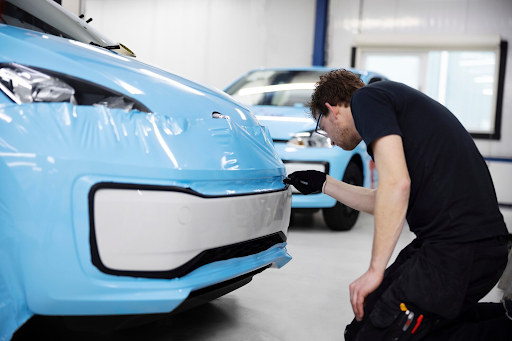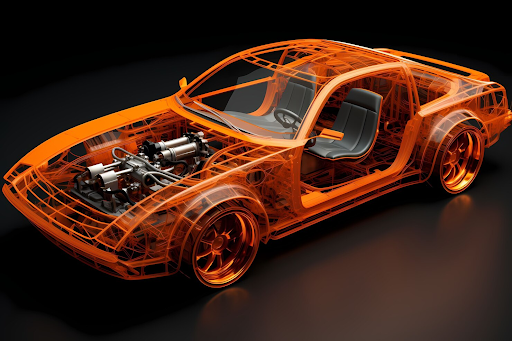 The car customization industry is booming like never before, fueled by a passion for personalization and the quest for performance. Enthusiasts and professionals alike are pushing the limits of what’s possible, turning ordinary vehicles into extraordinary masterpieces. Estimates show the car modifications market will achieve a market size of $69.17 billion by 2028.
The car customization industry is booming like never before, fueled by a passion for personalization and the quest for performance. Enthusiasts and professionals alike are pushing the limits of what’s possible, turning ordinary vehicles into extraordinary masterpieces. Estimates show the car modifications market will achieve a market size of $69.17 billion by 2028.
This finding is supported by a survey of automotive aftermarket manufacturers who expect 55 percent growth this year.
This surge in popularity isn’t just about aesthetics. It’s about crafting a unique driving experience that stands out on the road. Technological advancements expand the possibilities for customization, offering unprecedented precision, creativity, and efficiency.
Advanced Technologies in Car Customization
What are the technologies dominating the automotive aftermarket modification industry? Let’s find out.
3D printing: Revolutionizing custom parts
The era when 3D printing was primarily used for rapid prototyping in the automotive industry is over. 3D printing is seeing its potential in producing final car parts. In fact, by 2029, this market is projected to generate $9 billion in revenue.
It is now a game-changer in the car customization industry. This innovative process allows enthusiasts to create bespoke parts and components tailored to their specific requirements.
With 3D printing, complex geometries and intricate designs that were once impossible to achieve can now be realized with the help of professional 3D printers from Raise3D, offering limitless possibilities for customization.
Furthermore, 3D printing enhances the efficiency and speed of the customization process. Car owners can prototype and test parts quickly, ensuring they meet the desired specifications before final production. This saves time and reduces costs associated with trial and error. The versatility of 3D printing materials means that virtually any vehicle part can be customized, from interior components to engine parts. As such, achieving a truly unique and personalized car is feasible.
Augmented reality (AR) for design and installation
Augmented reality (AR) transforms car customization’s design and prototyping stages. Designers can visualize and assess virtual prototypes in real-world settings, examining fit, form, and function before production. This capability accelerates iterations and enhances designs, cutting development time and costs.
AR also supports collaborative design reviews, enabling stakeholders to interact with virtual models and provide crucial feedback.
Using AR glasses or mobile devices, users can project virtual images of custom parts onto their vehicles, providing a precise preview of the final product’s appearance. This capability enhances decision-making and ensures that modifications align perfectly with the owner’s vision.
In addition to design visualization, AR also streamlines the installation process. Technicians can use AR to overlay detailed instructions and guidelines onto the vehicle. This process makes complex installations more manageable and reduces the risk of errors. This technology improves the accuracy and quality of customizations and shortens the time required for modifications.
Advanced materials for superior performance
The development of advanced materials is another cornerstone of modern car customization. High-performance composites, such as carbon fiber and Kevlar, are increasingly used to enhance customized vehicles’ aesthetic appeal and functional performance.
These materials offer superior strength-to-weight ratios, which improve the vehicle’s overall performance by reducing weight while maintaining structural integrity. Custom body panels, spoilers, and interior components from these materials contribute to a sleek, high-performance aesthetic.
Moreover, advanced materials are not limited to aesthetics and performance. They are also critical in improving safety.
For instance, incorporating advanced materials to construct safety cages and reinforcement bars can significantly enhance crash resistance and passenger protection. This dual benefit of performance enhancement and increased safety makes advanced materials essential to modern car customization. They can be an excellent choice for enthusiasts who prioritize speed and security.
Smart technologies for enhanced control
Integrating smart tech into car customization has opened new avenues for vehicle control and personalization. One of the most notable developments is using advanced electronic control units (ECUs) that allow fine-tuned adjustments to a vehicle’s performance parameters.
ECU programming lets car owners fully realize their vehicles’ power. They can program engine performance and adjust suspension settings, among other things. These modifications provide an unparalleled level of customization that caters to individual driving preferences.
Smart technologies extend to interior customization, where features like advanced infotainment systems and customizable digital dashboards are becoming standard. These systems allow drivers to easily tailor their in-car experience, from adjusting ambient lighting to selecting personalized display themes. Integrating voice control and AI assistants further enhances the user experience, making it possible to control various aspects of the vehicle through simple voice commands.
Additionally, customized vehicles can incorporate a car navigation ECU to manage the vehicle’s mapping system. The ECU oversees several functions, including GPS tracking, map display, route planning, and real-time traffic updates. This feature can be especially critical when owners need towing services, ensuring drivers receive precise and efficient assistance.
This seamless blend of technology and customization ensures that every ride matches the driver’s preferences.
Laser cutting and CNC machining for precision parts
When it comes to car customization, laser cutting and CNC (Computer Numerical Control) machining significantly impact car customization.
Laser cutting provides unparalleled precision and accuracy, enabling the creation of intricate designs and patterns on various materials. This technology is beneficial for customizing body panels, grilles, and interior trim. This allows for detailed and unique aesthetic enhancements previously challenging to achieve.
On the other hand, CNC machining offers high precision in producing custom mechanical parts. This technology is essential for creating custom components such as engine parts, suspension components, and braking systems. The ability to produce parts with accurate specifications ensures that custom modifications do not compromise the vehicle’s performance or safety.
These innovations provide car enthusiasts with the tools to achieve high detail and precision in their customizations.
Embrace Car Customization Tech
Image by Freepik
The future of car customization is undeniably exciting, with advanced technologies continuously pushing boundaries. The possibilities for creating unique, high-performance, and personalized vehicles are limitless.
Ready to take your car customization to the next level? Dive into the latest technologies and start turning your vision into reality today. There’s never been a better time to explore the cutting-edge possibilities in automotive customization. Get creative and make your car truly yours.










